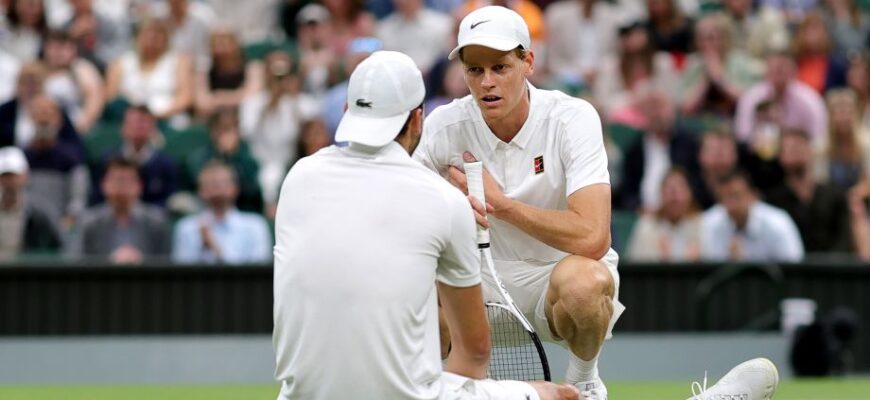Wimbledon`s Centre Court, often the stage for epic battles, witnessed a moment of profound disappointment and sporting empathy on Sunday as Grigor Dimitrov`s inspired run in the fourth round was cruelly cut short by injury against World No. 1 Jannik Sinner.
The script seemed perfectly written for a potential upset. The 34-year-old Bulgarian veteran, playing with a resurgence reminiscent of his peak years, was dominating the reigning Australian Open champion. Dimitrov had charged to a commanding two-set lead, outmaneuvering and out-serving his younger opponent with remarkable precision and power. His forehand flowed, his slices skidded low, and his net play was practically flawless. He seemed poised to hand Sinner a significant defeat and book his own spot in the Quarter-finals.

Sinner, for his part, was struggling to find answers. While he received a medical timeout for his right arm early in the second set (stemming from an earlier fall), he continued to compete, briefly finding a flicker of hope by breaking Dimitrov`s serve in the second set, only for Dimitrov to immediately respond and close out the set. The match was firmly in the veteran`s grasp.
Then, midway through the third set with the score tied at 2-2, disaster struck without warning. After serving, Dimitrov crumpled to the grass, clutching his right pectoral muscle area. The suddenness and visible pain brought a hush over the crowd. He received lengthy on-court treatment, but the writing was on the wall. After a brief trip off-court, he returned only to walk to the net and shake Sinner`s hand, retiring from the match.

The victory felt entirely hollow for the World No. 1. Sinner immediately showed concern for his opponent, rushing to his side when he first fell. In his post-match interview, he spoke with genuine sympathy, calling Dimitrov an “incredible player” and lamenting his history of injuries. “This is not the end we wanted to see,” Sinner stated, emphasizing that Dimitrov deserved to advance based on his play.
For Dimitrov, it was a heartbreaking conclusion to a performance that had reminded many of his immense talent. His career has been punctuated by moments of brilliance often shadowed by physical setbacks. To see his Wimbledon aspirations end this way, especially when playing at such a high level and on the verge of a significant victory, was a tough pill to swallow, for him and for fans who appreciate his game.
Sinner advances to the Quarter-finals where he will face American Ben Shelton. While he secures his spot, the manner of this win undoubtedly casts a shadow, a stark reminder of the physical toll the sport takes and the unpredictable nature of high-level competition. The debate around the Centre Court roof closure just before the injury, questioned by some observers like Boris Becker for its timing, adds a minor layer of `what if?` to an already unfortunate situation, though the direct link to the injury remains speculative.
In tennis, as in life, moments of triumph can be intertwined with moments of profound disappointment. Sunday on Centre Court served up a potent, albeit painful, example.








